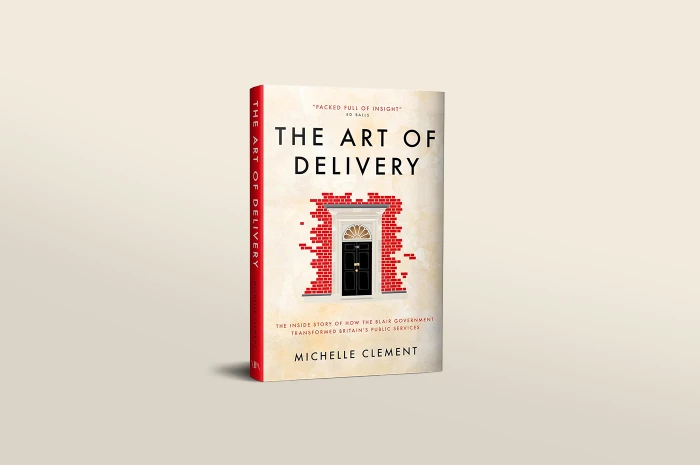

How can governments deliver improvements to public services that people feel and see? That’s a question addressed by Dr Michelle Clement in her new book The Art of Delivery: the inside story of how the Blair government transformed Britain’s public services. It’s a fascinating account of the work of the Prime Minister’s Delivery Unit (PMDU), when Tony Blair tasked Sir Michael Barber with driving the transformation of public services.
At Pivotal we are delighted that Michelle will be presenting a webinar about her book in a couple of weeks’ time (Tuesday 21 October, 2-3pm - sign up here). We look forward to hearing from Michelle, and also to thinking about how the themes of her book apply to Northern Ireland’s current public service challenges.
Improving delivery is rightly a focus for Northern Ireland’s political leaders. Since their return in February 2024, they have emphasised the importance of improving public services, their Programme for Government commits to transformation, and they have set up a new delivery unit in The Executive Office to support this. So, what can we learn from the PMDU years?
The Art of Delivery draws on Michelle’s unique access to 600,000 words of Barber’s diaries, together with research interviews with other key figures, all shedding new light on this seminal period of UK government. The book takes a chronological approach, looking at how the PMDU’s role and impact developed over time, with a particular focus on the main areas where Tony Blair prioritised making improvements: reduced health waiting times, increased school attainment, improved public transport, a more efficient asylum system, and lower crime. The book demonstrates clearly how the government machine adjusted to the Prime Minister’s requirement that delivery for the public should be at the core of its work.

The achievements of the PMDU are impressive and exemplify the value of focusing on the details that make the difference. Outcomes in health, education and crime all showed marked improvement, although transport proved more difficult. As PMDU’s persistent approach led to success, belief in the value of paying careful attention to delivery grew. While there are some critics of the approach, without a doubt it changed Whitehall culture, creating “a new enthusiasm for learning how to deliver”.
Through its emphasis on delivery, the public’s experience of the NHS, education, justice, and transport was put at the very heart of government and the civil service. Improving the effectiveness of public services was paramount, and delivered successes. What sits behind this and what learning can we take from it?
Four initial headlines stand out from Michelle’s book as useful learning for Northern Ireland:
Ownership and leadership of delivery from the most senior level is vital - success of this approach relied strongly on having the Prime Minister’s endorsement, attention and time.
The skills, experience and status of the delivery unit team are central to success - Michael Barber’s reputation and track record of delivery were essential for the impact PMDU made, together with the skills and experience of his team.
Strong and respectful relationships of trust with departments are essential - PMDU was “holding [departments] to account, and at the same time seeking to assist”. Improving delivery was a joint effort with departments, one where PMDU was seeking to add value to departments, rather than blame or harangue.
Processes should be clear and consistently applied - while the book does not detail the ‘science of deliverology’, the thorough and persistent focus on data, delivery contracts and constructive stocktakes underpinned PMDU’s impact.
So, what might this mean for public services here? Pivotal’s recent report Policy delivery in Northern Ireland sheds some important light on these issues in a local context. In 30 research interviews, we spoke to senior leaders with first-hand experience of policy delivery here from the civil service, voluntary sector, business and politics. Their conclusion was that policy delivery is rarely given sufficient priority, with questions hanging over whether the right leadership, processes, data or skills are in place.
Michelle’s book offers a detailed, informative and insightful glimpse into the PMDU. It’s a highly recommended read, not just for its description of ‘the art of delivery’ but also for its fascinating insights into the workings of government during this period. And it is timely, as Sir Michael Barber himself says in the Foreword: “There has never been a time in history when the need for governments to deliver on their promises has been more important than now.”
Ann Watt, Director of Pivotal.
‘The Art of Delivery: the inside story of how the Blair government transformed Britain’s public services’ is available from Biteback Publishing.
Join us for a Pivotal webinar to hear Dr Michelle Clement’s insights from the PMDU years and to consider what that means for delivering better public services in Northern Ireland now.
Sign up for the webinar on Tuesday 21 October, 2-3pm via Eventbrite here .
Pivotal Platform is a home for guest writers to contribute their perspectives on public policy debates in Northern Ireland. The views expressed by guest writers are not necessarily those of Pivotal.





